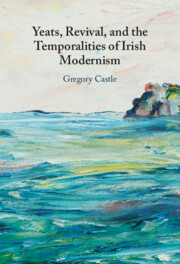Book contents
- Yeats, Revival, and the Temporalities of Irish Modernism
- Yeats, Revival, and the Temporalities of Irish Modernism
- Copyright page
- Dedication
- Contents
- Figures
- Acknowledgments
- Note on Citations
- Abbreviations
- Introduction Time, Recognition, and the Worlds of Yeats’s Work
- Chapter 1 The Irish Revival and Yeats’s Literary Nationalism
- Chapter 2 “A Dream-Heavy Land”
- Chapter 3 “O When Will It Suffice?”
- Chapter 4 “The Age-Long Memoried Self”
- Chapter 5 “I Make the Truth”
- Chapter 6 “They Had Changed Their Throats”
- Conclusion
- Works Cited
- Index
Chapter 5 - “I Make the Truth”
Cuchulain’s Heroic Worlds
Published online by Cambridge University Press: 11 April 2024
- Yeats, Revival, and the Temporalities of Irish Modernism
- Yeats, Revival, and the Temporalities of Irish Modernism
- Copyright page
- Dedication
- Contents
- Figures
- Acknowledgments
- Note on Citations
- Abbreviations
- Introduction Time, Recognition, and the Worlds of Yeats’s Work
- Chapter 1 The Irish Revival and Yeats’s Literary Nationalism
- Chapter 2 “A Dream-Heavy Land”
- Chapter 3 “O When Will It Suffice?”
- Chapter 4 “The Age-Long Memoried Self”
- Chapter 5 “I Make the Truth”
- Chapter 6 “They Had Changed Their Throats”
- Conclusion
- Works Cited
- Index
Summary
In Chapter 5, on Yeats’s series of plays about the legendary warrior Cuchulain, I return to the early period to take up a thread of Yeats’s development as a dramatist in order to illustrate a crucial aspect of his worldmaking project. The legendary world that he envisioned in this series evolved out of his need to overcome the intransmissibility of indigenous Irish culture in anything like an original or authentic form, a problem that Yeats confronted when he considered the role of folklore and legend in a national literature. The plays are also well suited, by virtue of the temporal extension of the series – from the first production of On Baile’s Strand (1904) to the composition of The Death of Cuchulain (1939) – to convey Yeats’s developing sense of personality and the ethics of heroism. By transposing the heroic world of Cuchulain, particularly as described by Standish O’Grady and Augusta Gregory, to the contemporary stage, Yeats does not revive the past in the interests of preserving it in amber. His task, like that of the literary revival at large, was not just to express the vitality of the past and its ethos but to place both at the forefront of a modern national literary movement.
- Type
- Chapter
- Information
- Yeats, Revival, and the Temporalities of Irish Modernism , pp. 160 - 187Publisher: Cambridge University PressPrint publication year: 2024

